- Home
- Neal Shusterman
Resurrection Bay
Resurrection Bay Read online
Contents
Begin Reading
Excerpt from Bruiser
About the Author
Back Ad
Credits
Copyright
About the Publisher
Begin Reading
When a glacier calves, you can hear it for miles, the crashing ice echoing back and forth between the towering peaks on either side of the bay. Sometimes you feel it before you hear it—a vibration in your bones that makes your whole body resonate like a tuning fork.
Bones. They know the call of the ice. They sense the relentless push of the glacier. Not just the bones of the living, but the bones of the dead, too.
I’ll tell you what I know—the strange things that happened one bleak and terrible September. I’ll tell you once, but I’ll deny I ever said it, and you’d be better off if you forget you ever heard it. But I’ll tell you all the same.
People say it all started the day that newlywed couple died at the face of Exit Glacier, but they just say that because people like things to have a beginning and an end. It makes them comfortable. The truth is, it started before any of us were born. Maybe even before there were people here at all.
“This world is older and stranger than any of us knows,” my dad said. “Never forget that, Anika.” My dad’s a helicopter pilot. In high season—that’s summertime—he makes his living taking tourists up into Alaska’s big sky to get a firsthand look at Nature’s Majesty: the Harding Icefield and the many glaciers that carve their way down the mountains, feeding into Resurrection Bay. We lived in Resurrection Bay—my dad, my brother, and me—in the port town of Seward.
Seward, not Sewer. It was named after the guy who bought Alaska from Russia. Not our fault he had a lousy last name.
In Seward, it’s all summer trade. A lot of businesses close up come fall, and people leave for the winter. But there are enough uses for a helicopter pilot in Alaska that my dad has plenty of work all year-round, so we stay.
On the day those newlyweds died, Dad got quiet and paced around the house, doing things like looking in the refrigerator as if he might find something uncommon in there, then turning the TV on and off, like he forgot what show he wanted to watch.
“You think he saw it, Anika?” my little brother, Sammy, asked as we watched our father bumble around the house that evening.
“He couldn’t have seen it,” I told him. “He was flying people up to the ice field when it happened.”
“Yeah, but he coulda seen it from the sky while he was flyin’.”
The truth was, Dad had given that very same couple a helicopter tour the day before, but the winds were too rough to land. Still, they wanted an up close and personal experience with a glacier, so they took a self-guided walking tour, right up to the face of Exit Glacier. It’s a glacier that hasn’t reached the sea for maybe a thousand years. It just kind of stops a few miles inland at the silt-filled remains of its old track, which now looks more like a tornado path—a long stretch of earth cleared by nature’s force and filled with little hills that mark the glacier’s advance in winter and retreat in summer, when it melts faster than it flows. And glaciers do flow, just very, very slowly.
The newlywed couple ignored all the big red signs that said DANGER! STAY AWAY FROM FACE OF GLACIER! They went right up to it, touched it, and even got some old lady to take a picture of them while they stood in front of it.
That’s when a hunk of ice about the size of a Hummer calved off the glacier directly over their heads, and, in seconds, newlywed became newlydead.
“I think the glacier kilt ’em on purpose,” Sammy said.
“Keep your opinions to yourself,” I told him. “Especially the stupid ones.”
So that night we had soup for dinner because Dad was too distracted to cook.
“I should have landed with them yesterday,” he kept mum bling. “If I had, they wouldn’t have gone out today, and they’d still be alive.”
“It’s not your fault, and you know it,” I told him.
“I know, I know; I’m just saying.”
My dad’s life is a box of “what ifs” neatly wrapped up in regret. Like the way he blames himself for Mom dying, even though he wasn’t even in the room when Sammy was born. It’s as if he thinks that if he feels bad enough about it, he’ll wake up one day and it won’t be true.
Me, I’m a realist. Things are the way they are. I move forward, kind of like a glacier—slowly and with no regrets, because I know what it takes to be happy.
The next morning the picture of the newlydeads that the old lady took was all over the papers—and not just the local ones—because it caught the smiling couple and the falling piece of ice just a few feet over their heads. It was one more thing for Dad to make himself miserable over.
It was the third week of September. With fall setting in, more and more people were closing shop for the winter, escaping to wherever it was summer folk lived for the rest of the year. It wasn’t exactly a ghost town here, but for the first few weeks it always felt like one until we got used to it again.
I decided to go up to Exit Glacier after school the next day—not just because of the tragedy, but because it had always been my favorite place. I could go there alone and not feel alone. I could go there with friends and somehow have a better time just because I was there. I’d read my favorite books there in the glacier’s shadow and had written my best poems. I was never dumb enough to get too close to its face.
Going there on that day, though . . . it was more than just wanting to be in the company of the glacier. Maybe I was having some kind of intuition or even a premonition—not the kind you see, but the kind you feel in your gut when you know something big is about to happen.
I went as far as last year’s moraine—the mound of earth that marks how far the glacier pushed last winter before the summer sun melted it back. It was a good fifty yards from the face of the glacier. There were other people around, too—lookie-loos watching as the workmen hacked at the ice with jackhammers and a bulldozer hauled ice away—all behind a police line that had gone up one day too late. They were trying to find the dead couple, but there was a lot of ice left to move.
I was content to keep my distance. I closed my eyes, held out my arms, and felt the glacier breathe.
Glaciers do breathe. It’s a scientific fact. Cold air is heavier than hot air, and so, depending on where you’re standing, you can feel the cold air breathing off the glacier, or the warm air rushing in. I always thought it was more than that, though. A glacier’s breath is not a soulless thing. It’s vital and fresh. It’s the reason why tourists can’t capture the truth of it on film. Because it’s not what you see; it’s what you feel when you stand in front of a wall of ice.
As I stood there, feeling the breath of the glacier flow around my upturned palms, I finally realized the reason I had come. I had come to ask a question.
Why?
Why did you take those people?
What had they ever done to you?
And I didn’t just mean this couple, but all the people who had lost their lives to Exit Glacier over the years. Ice climbers who tried to scale it and fell. People who slipped into a crevasse and were lost. And the many who, like this sad couple, became victims of falling ice.
Why?
And then I heard a voice behind me.
“You look like an idiot!”
I put my arms down and turned around. I knew that voice better than anyone’s in town. It was Rav Carnegie, all spiky black hair and smirks. I hadn’t spoken to him yet this school year, since we were giving each other a mutual cold shoulder.
“At least I have to work at it,” I told him. “But you look like an idiot without even trying.”
He laughed at that and
then climbed to the top of the moraine with me. “Have they found the bodies?” Rav asked.
“They wouldn’t still be digging if they’d found them.”
Rav is what you might call my off-season boyfriend. During the summer, we hate each other, mostly because he’s jealous of the summer boys I date, and I’m jealous of the summer girls who are always hanging around him. Then the summer people go, we make up, and it’s back to old times.
Rav is short for Raven, which he hates, and Carnegie is a name his parents made up because they were musicians and had once dreamed of playing in Carnegie Hall. When it didn’t work out, they’d settled for stealing the name. People think he’s part Tlingit because of his dark hair, but he’s not. I am, though, on my mother’s side. Maybe that’s why I’ve always felt a connection to the ice.
“They’re never gonna find them,” Rav said as we watched the bulldozer haul away another heaping shovelful of ice. “The glacier moves forward faster than they can take the ice away.”
“It’s so sad,” I said.
“They were stupid,” said Rav. “Tempt fate, and guess what? Sometimes it gives into temptation. Starburst?”
He handed me the piece of candy, and I took it. This year a Starburst was the signal that we had made up.
We stood there for a while talking about the new school year and how tenth grade wasn’t much different from ninth grade. As we turned to go, I felt a chill that penetrated deep. The breath of the glacier made my neck hairs stand on end, and there was a rumbling in the earth.
“Did you hear that?”
Rav shook his head, maybe because it wasn’t a sound at all, it was a feeling—that vibration in my bones. I looked to the glacier just in time to see a hunk of ice the size of an eighteen-wheeler break free from the face and begin a long, slow plunge.
The workmen ran for cover, but the bulldozer driver was caught in his cab. He kicked at the door in a panic until it finally swung open, and he leaped out just in time. The massive chunk of blue ice hit the bulldozer, completely burying it.
“No way!” said Rav.
The workmen, now a safe distance away, peeled off their hard hats, scratched their heads, and counted their blessings.
Then I noticed something that no one else had seen yet. I had to focus all my attention to make sure it wasn’t just my imagination.
Rav must have noticed the look on my face.
“What is it?”
“The glacier. It’s moving.”
“Glaciers are always moving,” he pointed out.
“No,” I said. “This glacier is really moving.”
And then he saw it, too. The glacier was pushing forward. Another chunk of ice fell, then another, then another. It was coming toward us. Not at the speed of an avalanche, of course—maybe just an inch or two per second—but for a glacier that’s lightning fast.
Now that bone-deep feeling was stronger than ever, and I knew that Rav felt it, too, because he looked almost as pale as the cloudy sky.
Then something dawned on me, like a secret whispered in my ear—but it didn’t come through words. It came in that bone-feeling shinnying up my arms and legs, vibrating in my joints.
The glacier wants something.
It wants something, and it’s coming to get it. . . .
Glaciers are just like rivers. Watch a glacier in time-lapse, and you’ll see it surging forward, digging into the earth, dragging hundred-ton boulders along with it. Glaciers are forces of nature as powerful as floods or hurricanes. They just do their devastating business much more slowly. Most of the time.
There was no scientific explanation as to why Exit Glacier decided to surge forward as suddenly, and as powerfully, as it did. That first day they calculated that it was moving at a speed of fifteen inches per minute. That might not seem fast, but when a wall of ice a quarter of a mile wide decides to move like that, it takes out everything in its path: trees, buildings, bridges. Everything. In a single day it had pushed forward nearly half a mile and had ripped out a major highway on its relentless push toward Resurrection Bay. And we all knew there was only one way it could get to the bay:
Straight through Seward.
If the glacier kept on moving, it would reach the city in three days and completely destroy it, pushing everything that couldn’t move out of its way into the sea.
I made dinner that night since Dad was off on an emergency run, flying geologists down from Anchorage.
“If I climb up on the roof, d’ya think I might be able to see the glacier from here?” Sammy asked me.
“No, but if you climb up on the roof, you’ll fall off and break your neck, and I’ll get to have your room.”
He threw a pea from his dinner plate at me but said nothing more about it. I’m not sure whether he was more worried about breaking his neck or me getting his room.
It was strange how the next day things went on as usual—at least at first. We had school that day, and although everyone talked about the glacier, we all went about our business, from class to class. It was surreal, as if the glacier’s approach was some alternate reality.
When I got home, though, reality hit. Dad had spent the day flying a team of experts over the glacier, so he knew more about this “phenomenon” than anyone else in town . . . and he was packing up all our belongings in his pickup truck.
You have to understand, this was more than just an evacuation for us, because to Dad, his home was very much his castle. See, after Mom died, Dad fixed up the house. He patched the roof, and painted the porch, and put up a white picket fence around the yard so that our house was the envy of Seward. It looked like the model of hometown America—but with one problem. Our household was one member short. Still, Dad kept up the house, the yard, and that perfect picket fence religiously, like they were the only things keeping us together. But the truth was, he was the only thing keeping us together.
So you can imagine that seeing him packing up things in that prepanic kind of way made me feel like the world was coming apart all over again.
“There’s not much room,” he told Sammy and me. “Just take the things you really care about.”
He tried to comfort us by telling us that Seward wouldn’t be hit for two more days, but debris was already being shaken loose from the mountains and landing on the road to Anchorage. If that road got taken out, the only ways out of Seward would be by sea and sky—and there simply weren’t enough boats or helicopters to rescue everyone. After the initial numbness, people were beginning to leave town any way they could.
We couldn’t go yet, though; Dad needed to fly the geologists around, so that night he took our overpacked pickup, and we all went to stay with Rav and his dad, since they lived on higher ground that was out of the glacier’s path. Our fathers were good friends because they had found a common misery: dead wives. My mom died giving birth to Sammy. She was Tlingit, and one of her brothers had said it was punishment for marrying my dad, who’s not. Because of that, Dad won’t have anything to do with that side of the family anymore. Rav lost his mom just a couple of years ago. She was an ecologically conscious woman, always trying to save nature—but nature didn’t save her. She wrapped her Prius around a tree one rainy night.
“When I can drive,” Rav had once told me, “I’m gonna get a car with a huge Hemi engine and guzzle gas like there’s no tomorrow, because nature deserves to suffer.”
Rav’s got issues.
Late that evening, while Sammy slept and Dad drank away his sorrows with Mr. Carnegie, Rav and I sat on his porch. Even from this far away you could feel the glacier churning up the earth and hear the fracturing of ice and the ominous falling of trees.
“Do you think you’ll leave Seward for good?” Rav asked me. “It would suck if you left for good.”
I was going to tell him that there’d be no Seward to come back to—that it was the end of life as we knew it. But instead I said, “We’ll have to see how bad it is.”
A breeze blew across the porch. Cold air out, warm
air in. The glacier’s breath. I shivered, and as I wrapped my arms around myself, I must have caught the clasp on my charm bracelet, because it fell and slipped between the wooden porch slats, disappearing into the darkness below.
“I’ll go get a flashlight,” said Rav. When he came back, we went under the porch, squeezing into the low, muddy crawl space draped with the abandoned webs of spiders long dead and a few old, cranky spiders that should have been dead but for some reason weren’t and were now really, really big.
But I wasn’t going to think about that. The charm bracelet had been a gift from my mom, so I’d deal with the spiders. Rav had a vested interest, too, since he had bought me a few of the newer charms.
However, once we had made our way to the right spot under the porch, the bracelet was gone.
“Maybe it’s still stuck in the slats,” I said.
We looked up; it wasn’t there.
That’s when I felt something brush across my arm. Something cold. I gasped and dropped the flashlight, and it went out.
“Don’t worry,” said Rav, “I’ll get fresh batteries.”
“It’s probably the bulb!” I called after him, but he was already gone.
I was alone now in the dark . . . but I had the eerie sense that I wasn’t alone at all. There was some light coming down between the slits from the porch—not enough really to see by, but enough to catch faint glimpses of things. For a second, I thought I heard breathing, and then something moved just a few feet away from me. Something big!
I panicked. I knew there were all kinds of wild animals in this area. Wolves and wild dogs. An angry raccoon could rip your eye out. A frightened bear cub could tear you to shreds.
I scurried away, painfully slamming my head against a crossbeam on the way. In my panic, I had lost my sense of direction and came up against the house instead of the yard. I turned again but banged up against a post—and now I could feel a presence very, very close to me.
Terrified of the dark and of the nature of this thing I couldn’t see, I desperately tapped my flashlight once, twice; and then on the third time, I must have hit it just right, because it came on—

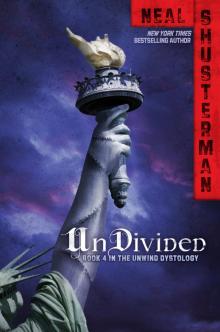 UnDivided
UnDivided UnBound
UnBound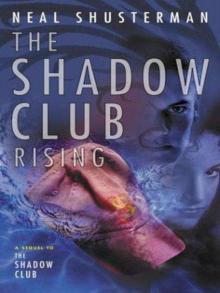 The Shadow Club Rising
The Shadow Club Rising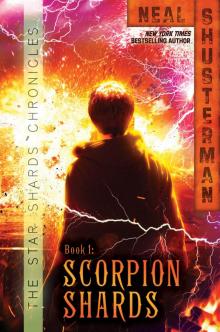 Scorpion Shards
Scorpion Shards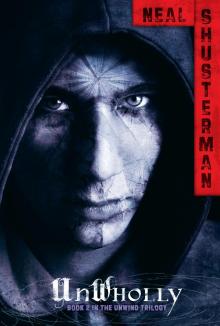 UnWholly
UnWholly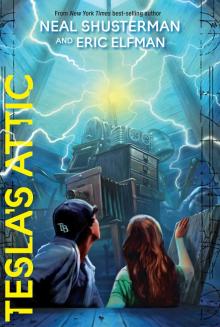 Tesla's Attic
Tesla's Attic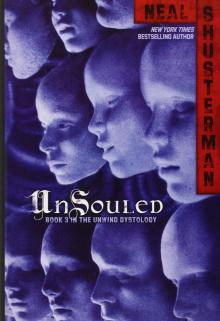 UnSouled
UnSouled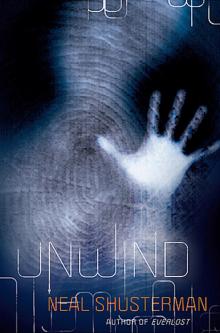 Unwind
Unwind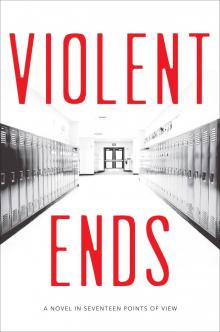 Violent Ends
Violent Ends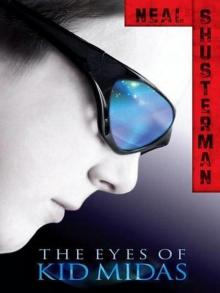 The Eyes of Kid Midas
The Eyes of Kid Midas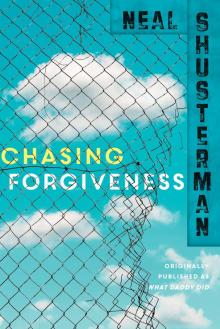 Chasing Forgiveness
Chasing Forgiveness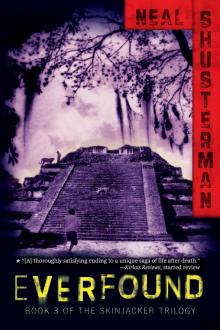 Everfound
Everfound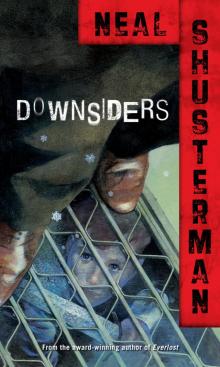 Downsiders
Downsiders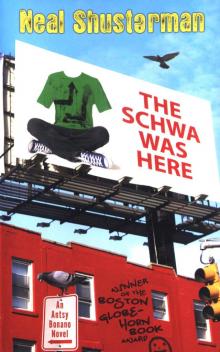 The Schwa Was Here
The Schwa Was Here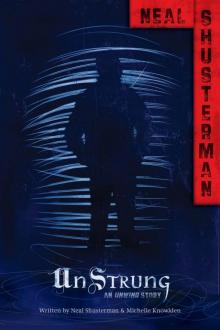 UnStrung
UnStrung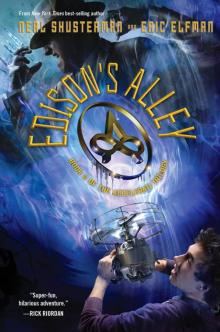 Edison's Alley
Edison's Alley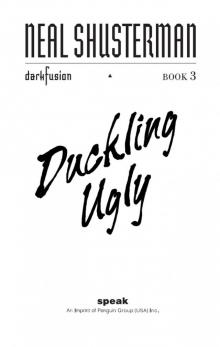 Duckling Ugly
Duckling Ugly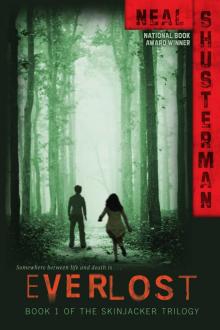 Everlost
Everlost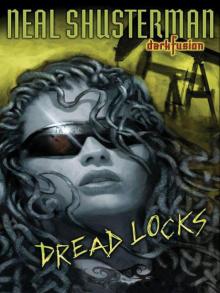 Dread Locks
Dread Locks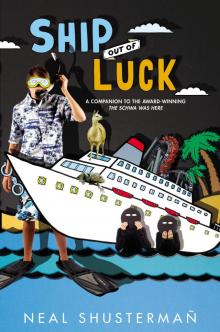 Antsy Floats
Antsy Floats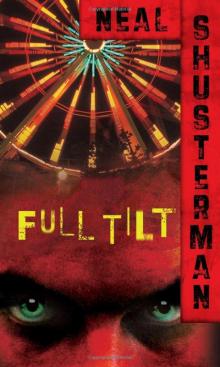 Full Tilt
Full Tilt Thunderhead
Thunderhead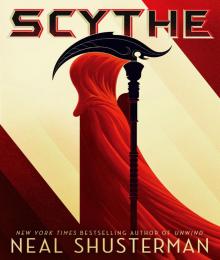 Scythe
Scythe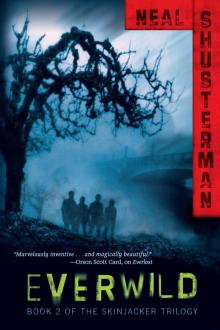 Everwild
Everwild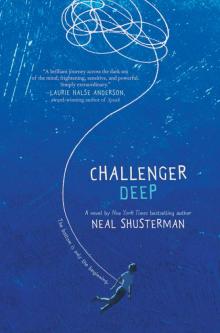 Challenger Deep
Challenger Deep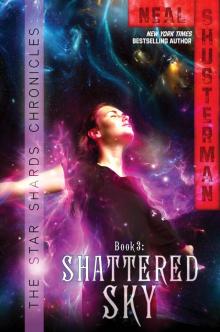 Shattered Sky
Shattered Sky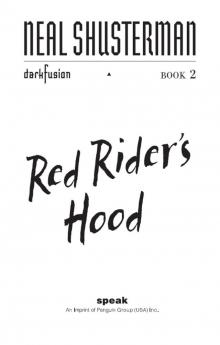 Red Rider's Hood
Red Rider's Hood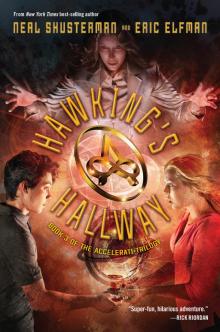 Hawking's Hallway
Hawking's Hallway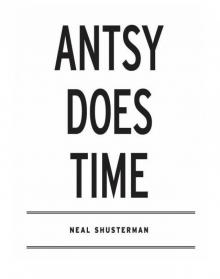 Antsy Does Time
Antsy Does Time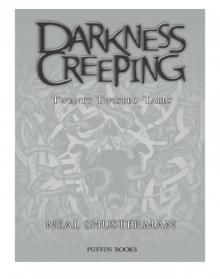 Darkness Creeping: Twenty Twisted Tales
Darkness Creeping: Twenty Twisted Tales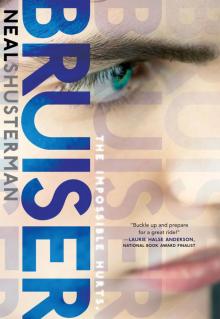 Bruiser
Bruiser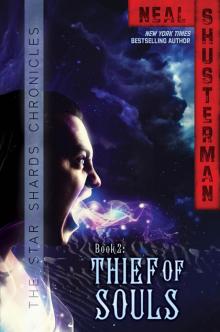 Thief of Souls
Thief of Souls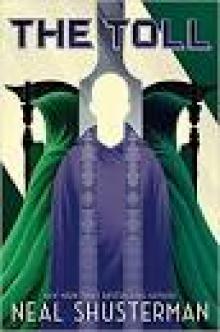 The Toll
The Toll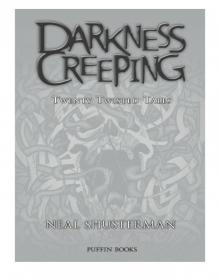 Darkness Creeping
Darkness Creeping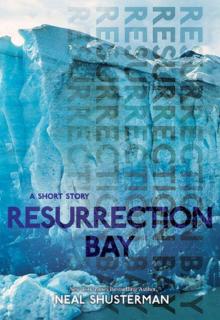 Resurrection Bay
Resurrection Bay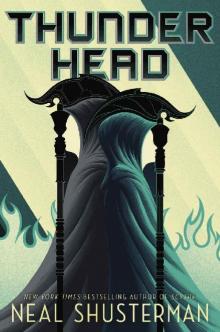 Thunderhead (Arc of a Scythe Book 2)
Thunderhead (Arc of a Scythe Book 2)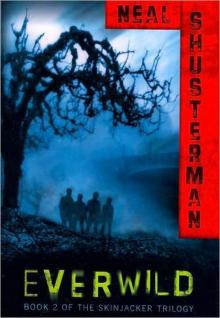 Everwild (The Skinjacker Trilogy)
Everwild (The Skinjacker Trilogy)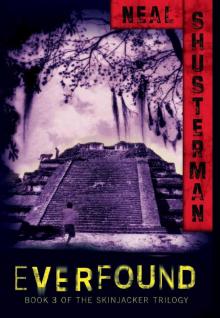 Everfound s-3
Everfound s-3 Edison’s Alley
Edison’s Alley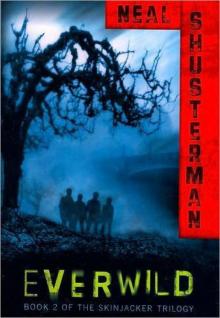 Everwild s-2
Everwild s-2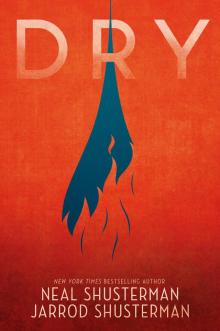 Dry
Dry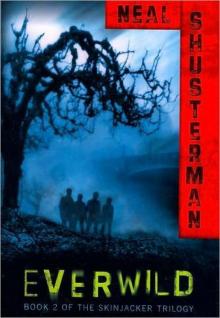 Skinjacker 02 Everwild
Skinjacker 02 Everwild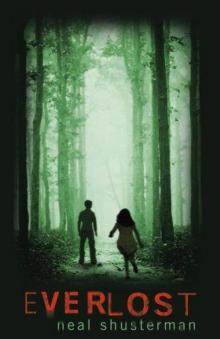 Everlost s-1
Everlost s-1